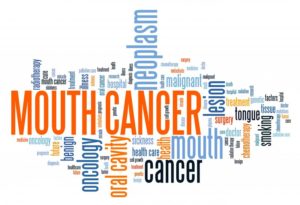
53,000. That’s the number of people who are expected to be diagnosed with oral cancer this year. While the disease is actually very treatable when detected early, only about 50% of these new diagnoses are expected to survive the next 5 years. Why is this the case? That’s because the disease often isn’t caught until it’s quite advanced and virtually impossible to treat. Starting this November, which is officially Mouth Cancer Action Month, make sure you follow these 3 tips so oral cancer doesn’t have a chance to sneak up on you and claim another life.
Keep An Eye Out for the Early Signs
One of the biggest problems when it comes to oral cancer is that most people don’t really know what the early signs are, meaning they only go to see a doctor once symptoms are very obvious and the cancer has already progressed to a dangerous stage. Occasionally, be sure to take a close look inside your mouth and look for the following telltale signs of cancer:
- Persistent oral sores that bleed easily and won’t heal
- Scaly or discolored patches of tissue that stick out
- A new lump or growth
- Chronic pain in the lips, tongue, or mouth that doesn’t seem to have a dental cause
Other symptoms like chronic sore throats, a voice that is hoarse all the time, and constantly having the feeling that something is stuck in your throat may also indicate oral cancer. So, what should you do if you notice any of these? Be sure to…
Contact Your Dentist
In addition to searching for cavities and gum disease during your regular checkups, your dentist will also be on the lookout for the initial signs of oral cancer. Their trained eyes are able to see things you can’t, so it’s extremely important that you attend your twice a year appointments. If they spot something suspicious, they can arrange for you to get a biopsy for a diagnosis, which will enable treatment to start right away if needed. Should you notice any oral cancer symptoms between appointments, you should call your dentist immediately so they can give you a screening.
Avoid Little Known Risk Factors
It’s common knowledge that using tobacco and drinking excessively can drastically increase your chances of developing oral cancer, but over the years, research has revealed other risk factors that you might not know about, including:
- Excessive sun exposure on the lips
- Persistent chewing on the cheeks
- Human papillomavirus (HPV)
- Ill-fitting dentures (this can lead to inflammation within the mouth that can turn into cancer)
By checking your own mouth from time to time, minimizing all risk factors, and regularly seeing your dentist, you can largely keep yourself safe from oral cancer for decades to come. If any of this information was new to you, it probably means your friends and family are unaware of it as well, so be sure to share to help them stay protected, too.
About the Author
Dr. Adam Cohlmia provides top-quality dental care that is designed to not only protect his patients’ teeth, but their overall health as well. That’s why he always performs oral cancer screenings whenever someone comes to see him, and he also makes sure his patients know what to look out for between appointments. To learn more tips on how to avoid oral cancer or schedule your next screening, give us a call today.
